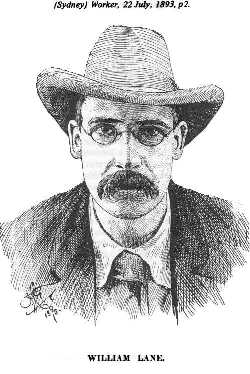Lane was born on 6 September 1861 in Bristol, England, eldest son of James Lane, a landscape gardener, and his English wife Caroline, née Hall. Prior to coming to Australia, Lane had a youthful adventure in Canada and the United States, working in both unskilled and skilled jobs until he became a reporter in Detroit at age 24. He also married (Anne Mary Macquire) and read Henry George and Edward Bellamy in these years. In 1885 the Lanes came to Australia, settling in Brisbane. Lane’s three brothers had also emigrated. By this time, Lane was reading Adam Smith, Karl Marx and Laurence Gronlund.
While continuing as a journalistic writer, Lane became an active participant in the early trade union movement. From 1887 he co-edited the weekly Boomerang. He was intellectually responsible for gross populism through his idealization of the Queensland bushworkers, and his racist polemics. The latter was common among labourites who feared cheap wages as a result of Chinese and Pacific Islander immigration, but Lane gave it an apocalyptic tone in his serialised first novel, White or Yellow? A Story of the Race-War of A.D. 1908.
In 1889 Lane’s work led to the formation of the Australian Labour Federation, and in 1890, Lane became the editor of the federation’s newspaper, The Worker. Lane came to prominence in the wider Queensland society during the bitter 1891 strikes, and in particular, through his ironically titled novel, The Working Man's Paradise (Brisbane, 1892). It was during these years he became a utopian. The term has justifiably become either a very plain derogative gesture or jesting quip. However, in the late nineteenth century it was a serious intellectual framework, through the works of Robert Owen, William Morris and Edward Bellamy. In 1891 Lane and his associates organised the New Australia Co-operative Settlement Association, and 463,000 acre settlement was founded in Paraguay in 1893, known as New Australia. What we now know of the stereotypical characteristics of utopian communities plagued the New Australia colony: autocratic leadership, austere and quasi-religious communism and schism resulting in a new site (called Cosme).
In 1899 Lane and his family abandoned the Cosme project and immigrated to New Zealand. From 1900, Lane is transformed into a political conservative. In 1913 he becomes the editor of Auckland's conservative newspaper, New Zealand Herald. In contrast to his previous socialist life in Queensland, Lane denounces industrial lawlessness, advocates the introduction of universal military training and glorifies war in patriotic fervour.
See William Lane on Scatterplot Matrix.
Reference
Gavin Souter, 'Lane, William (1861–1917)', Australian Dictionary of Biography, National Centre of Biography, Australian National University, http://adb.anu.edu.au/biography/lane-william-7024/text12217, published in hardcopy 1983, accessed online 19 September 2014.


